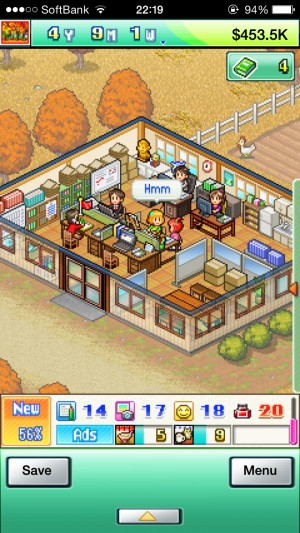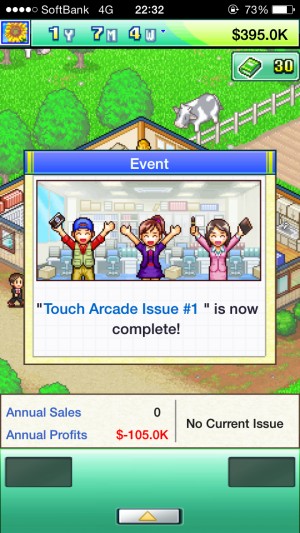 Kairosoft makes a lot of games. Rather, I suppose they made a lot of games and have been diligently porting them over to smartphones ever since. They’re not bad games. If you happened to be trapped in an elevator for a couple of days with one, you might not even notice you didn’t hit your floor. That said, they are extremely similar to one another, relying on the same few templates spread across every single job anyone ever had or will have. It wears on you after a few games, especially if you fall into a row of their building simulations. I’ve often said that any given Kairosoft game is going to be amazing if it’s your first and mind-numbing if it’s your fifth. The sad thing in all of this is that the template that brought them to the dance, so to speak, is the least-recycled of them all. Game Dev Story ($4.99) put Kairosoft on the international map years ago, and the biggest request everyone has made since is for a sequel. Kairosoft marches to their own beat, though, and that beat apparently dictates that there shall be only one Game Dev Story per Halley’s Comet appearance.
Kairosoft makes a lot of games. Rather, I suppose they made a lot of games and have been diligently porting them over to smartphones ever since. They’re not bad games. If you happened to be trapped in an elevator for a couple of days with one, you might not even notice you didn’t hit your floor. That said, they are extremely similar to one another, relying on the same few templates spread across every single job anyone ever had or will have. It wears on you after a few games, especially if you fall into a row of their building simulations. I’ve often said that any given Kairosoft game is going to be amazing if it’s your first and mind-numbing if it’s your fifth. The sad thing in all of this is that the template that brought them to the dance, so to speak, is the least-recycled of them all. Game Dev Story ($4.99) put Kairosoft on the international map years ago, and the biggest request everyone has made since is for a sequel. Kairosoft marches to their own beat, though, and that beat apparently dictates that there shall be only one Game Dev Story per Halley’s Comet appearance.
Here’s the next best thing, however. Magazine Mogul ($4.99) is for all intents and purposes a sequel to Game Dev Story. Its core gameplay is identical, but with more gravy slathered on top. It pulls in some of the advances from more recent Kairosoft efforts to provide a satisfying evolution to the gameplay, with the only real downer being that instead of making weird video game ideas, you’re making weird local magazine story ideas. I think we can all agree that video games are infinitely more interesting than local magazines, right? If you can get over that, this is the follow-up you may have been waiting for before you gave up and moved on to other things. Your job is to run a successful magazine, and for some reason, also help run the town you’re based in. The magazine you run doesn’t have a regular schedule, with each issue releasing whenever you happen to get it finished. Given the amount of time it takes to put one together, you can usually get out a couple editions per year, so you’ll want to make them good ones.
 There are a handful of things you need to decide on for each issue. You need to settle on which advertisers you’re going to work with, which kind of regular column you’re going to feature, and the details of your main story. For each main story, you can choose a location, a topic, and who the feature is aimed at. As an example, you might decide to have a story about businessmen and pajamas by the river, if you’re absolutely insane. Once the plan is decided, your staff will get to work on it, adding points to its writing, design, and interest qualities based on their stats. They’ll also boost the ads and sometimes make typos. You’ll have to choose a staffer to go out on location to take pictures, and another one to touch up the writing. The last step before it’s finished is proofreading, where all the typos are corrected in exchange for an equal number of research points. The more typos you have, the longer this stage will take. After that, it’s off to the stands to see how it sells.
There are a handful of things you need to decide on for each issue. You need to settle on which advertisers you’re going to work with, which kind of regular column you’re going to feature, and the details of your main story. For each main story, you can choose a location, a topic, and who the feature is aimed at. As an example, you might decide to have a story about businessmen and pajamas by the river, if you’re absolutely insane. Once the plan is decided, your staff will get to work on it, adding points to its writing, design, and interest qualities based on their stats. They’ll also boost the ads and sometimes make typos. You’ll have to choose a staffer to go out on location to take pictures, and another one to touch up the writing. The last step before it’s finished is proofreading, where all the typos are corrected in exchange for an equal number of research points. The more typos you have, the longer this stage will take. After that, it’s off to the stands to see how it sells.
This is all nearly the same as Game Dev Story, of course. You can hire on new staffers, level up or train the existing ones to boost their stats, and spend your money on various promotional campaigns to increase the size of your audience. While I’d be fine with a straight retread simply because they haven’t done one until now, there are a couple of new things stapled on to try and push things forward a little bit. One of them works well, the other is kind of odd and out of place. First, instead of relying on research or pure happenstance to get new locations and topics for your features, you need to go out and scout at existing locations. Scouting involves sending a party of staff members to the spot, where they’ll encounter walls that impede their progress and investigation points that they need to try to overcome. Success earns you new courses, new locations and topics, cash, research points, and more. These scouting missions play out pretty similarly to the party exploration missions in other Kairosoft games like Dungeon Village ($5.99), so they’re not totally new, but they do add an interesting wrinkle to the familiar gameplay.
The other added piece, the town management, doesn’t fit quite so well. At a certain point in the game, you’re tasked with helping your town grow. The town has its own separate budget, and you can spend it on various initiatives to try to increase the population. If you’re successful at this, your potential readership grows and new locations are unlocked. There’s not much to it other than going in and picking a couple of new things each time you’re allocated more money, with a little mental subtraction to make sure you can afford the upkeep until the next budget comes through. It’s shallow, extraneous, and has no logical connection to the main situation, so it really feels like something they threw in just for the sake of it. It’s not so much a negative point as it is a squandered positive, though. It’s easy enough to do the bare minimum. You’ll still win anyway.
As with almost all of Kairosoft’s games, Magazine Mogul is light on challenge. While you can meet the occasional setback if you go with weird features, for the most part your numbers will only go up as you play. If you start to run out of money, it will magically appear from the ether so that you won’t face a game over situation. You have to mix and match meta-goals to end up with something difficult to take on, like trying to win the grand prize in the annual awards before a certain number of years is up. If you just want to play and watch your numbers rise, the game will easily accommodate you. It’s not as much of a problem here as it can be in some of their other games because there’s plenty of enjoyment to be had from unlocking everything and playing around with crazy combinations.


The pacing works really well in this game too, though it’s little surprise as that’s typically one of Kairosoft’s strongest areas. It’s hard to quit when you’re in the middle of putting together an issue, and then you’ll really want to see how it does sales-wise before you stop playing, but you should probably start your next issue so that you don’t waste any time, and oh my goodness, it’s two in the morning. All of Kairosoft’s games can hit you with that particular whammy if you allow yourself to get into them, but this one is easier to fall into than most of their library. I think a lot of this is down to the game avoiding unnecessary micromanagement. It communicates its theme clearly and logically without having to teach you where to put the soda machines for maximum yield. It gives up a little depth as a result, but Kairosoft games tend to be in the shallow end of the pool anyway, so it’s not a heavy blow.
Magazine Mogul serves to at least partially fulfill the wishes of people waiting for a sequel to Kairosoft’s first breakout release. It’s not as original as some of their recent titles like Kairobotica ($4.99), but the familiarity isn’t a bad thing in this case. The game it’s built on is quite beloved and it has been years since its release, so getting a second game that follows its dance steps is a good thing, in my opinion. This is probably the most fun I’ve had with a Kairosoft game since Dungeon Village, even though I have to admit a great deal of my affection comes from its similarity to Game Dev Story. If you’re still carrying a torch for that game, you might want to give Magazine Mogul a look.